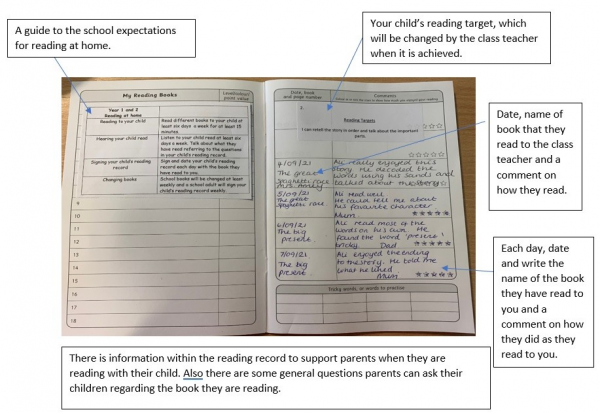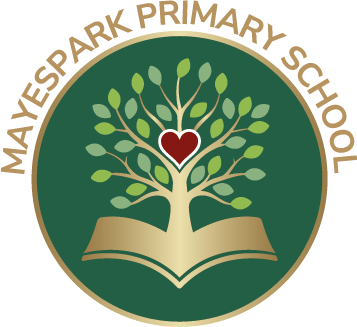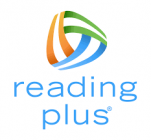Support for Parents
At Mayespark, we want all parents and carers to feel welcome and equipped to support their child's learning at home. When starting a new academic year, it is natural for parents to have various questions. In order to share key information, our teachers have produced welcome videos which we trust you will find of use.
Click here for the EYFS welcome video Powerpoint Slides
Click here for the Year 1 welcome video Powerpoint Slides
Click here for the Year 2 welcome video Powerpoint Slides
Click here for the Year 3 welcome video Powerpoint Slides
Click here for the Year 4 welcome video Powerpoint Slides
Reading at home
Reading Expectations
Reading at home greatly helps children develop a wider vocabulary. This helps them to perform better in their SATs. Research tells us that children who are read to daily, hear around 1.4 million more words than their peers who are not read to daily. In turn, this helps to improve their written work as well as their understanding of more complex texts as they grow older. School is not the only place children should experience books!
At Mayespark we have clear expectations regarding how frequently and how long children need to read for at home. These are set out below for each phase. At primary school, all children will benefit from hearing an adult read to them. This does not need to be a school book but might be an encyclopaedia, a novel or even a magazine!
In addition to this, we expect children to practise reading their school reading book. Discussing books with children is crucial to develop their comprehension skills and widen their vocabulary. Each child at Mayespark will have a reading record which we expect to be completed daily. A good example of how this can be done is set out below.

|
EYFS |
|
|
Reading to your child |
Read different books to your child at least six days a week for at least 15 minutes. |
|
Hearing your child read |
Listen to your child read at least six days a week. Talk about what they have read referring to the questions in your child’s reading record. |
|
Signing your child’s reading record |
Sign and date your child’s reading record at least six days a week, showing the book they have read to you. |
|
Changing books |
School books will be changed at least weekly and a school adult will sign your child’s reading record weekly. |
|
Year 1 and 2 |
|
|
Reading to your child |
Read different books to your child at least six days a week for at least 15 minutes. |
|
Hearing your child read |
Listen to your child read at least six days a week. Talk about what they have read referring to the questions in your child’s reading record. |
|
Signing your child’s reading record |
Sign and date your child’s reading record at least six days a week, list the book they have read to you and page numbers. |
|
Changing books |
School books will be changed at least weekly and a school adult will sign your child’s reading record weekly. |
|
Year 3 and 4 |
|
|
Reading to your child |
It is still important that parents/carers read to older children. This may involve reading together and talking about non-fiction texts. For example, a newspaper article or an information book about the topic they are interested in. |
|
Hearing your child read |
Children are to read at least six days a week for at least 20 – 30 minutes a day. Once your child has been told by their teacher they are an ‘Independent Reader’, they may prefer to read their reading book on their own. |
|
Signing your child’s reading record |
Sign and date your child’s reading record each day they have read, recording the page numbers. Independent readers can record in their reading record themselves and parents are expected to sign it once a week. |
|
Changing books |
Children can change their reading book whenever they need to. Class teachers will check reading records daily and will sign/ comment in your child’s reading record once every three weeks. |
|
Year 5 and 6 |
|
|
Reading to your child |
It is still important that parents/carers read to older children. This may involve reading together and talking about non-fiction texts. For example, a newspaper article or an information book about the topic they are interested in. |
|
Hearing your child read |
Children are to read at least six days a week for at least 30 minutes a day. Once your child has been told by their teacher they are an ‘Independent Reader’, they may prefer to read their reading book on their own. |
|
Signing your child’s reading record |
Sign and date your child’s reading record each day they have read, recording the page numbers. Independent readers can record in their reading record themselves and parents are expected to sign it once a week. |
|
Changing books |
Children can change their reading book whenever they need to. Class teachers will check reading records daily and will sign/ comment in your child’s reading record once every three weeks. |
Recommended reading lists
There is such an extensive range of wonderful children’s books, sometimes it can be difficult to know which ones to choose to read! To help parents, we have produced recommended reading lists which include texts ranging from beloved childhood classics to fantastic fantasies. Children will not necessarily bring every book on these lists home from school and books can be expensive to purchase. We therefore suggest parents visit their local library to borrow the books. It is often possible to order books which they do not have. Using the following recommended reading lists will help to inspire children’s love of reading.
Learning Videos
In schools today, there are many teaching methods and strategies used which are unfamiliar to lots of parents. This can sometimes cause barriers for parents and children when it is time to complete homework.
At Mayespark, we want to facilitate parental engagement in learning and so have produced and identified a number of helpful videos to support both parents and children at home.
Maths
The following videos will give you examples of the different mathematical methods teachers use at Mayespark:
Year 1 - Addition
Year 1 - Subtraction
Year 2 - Addition
Year 2 - Subtraction
Year 2 - Division
Year 2 - Multiplication
Year 3 & 4 - Addition
Year 3 & 4 - Subtraction
Year 3 & 4 - Division
Year 3 & 4 - Multiplication
Year 5 & 6 - Short Division
Year 5 & 6 - Short Multiplication
Year 5 & 6 - Long Division
Year 5 & 6 - Long Multiplication
Letter Formation
It is crucial for children to learn how to write letters using the correct formation. When children first learn their letters in Reception, they are taught how to correctly form each letter using a simple rhyme.
The following videos go through each rhyme in the order children are taught each letter. We encourage parents to regularly practise letter formation at home.
m,a,s,d,t
i, n, p, g, o
c k u b
f, e, l, h, r
j, v, y, w
z, q, x
Read Write Inc
At Mayespark we use a programme called Read Write Inc (RWI) to teach children phonics. Through this, all children learn to read fluently and at speed. At Mayespark Primary School we begin the programme in Nursery and will continue teaching RWI to children beyond the age of 7 where needed. You can find out more information about the RWI programme through the following link:
https://www.youtube.com/watch?v=sjlPILhk7bQ
Through the RWI programme, sounds are taught in three sets. We encourage parents to practise saying sounds at home. It is important that parents are aware of which set of sounds their child is being taught in school as it is important that children learn sounds in the correct order. The following video shows how each sound must be pronounced.
https://www.youtube.com/watch?v=yln6PpV1G1I
As children learn to recognise and pronounce sounds they will begin to start blending them into words. The following video is an example of how this is done.
There is much more information on our website about the different aspects of RWI. This can be found on our English page. We have recently held a RWI parents' meeting, you are able to view the powerpoint slides and handout below.
Websites we recommend which support your child’s learning:
Reading Plus
Children in Year 3-6 will have a log in for Reading Plus. This programme enables children to develop reading efficiency.
As a school we use an application called Wonde. This is a single sign on service which allows children to use one username and password to access a number of different websites we subscribe to as a school. Every child at Mayespark from Reception upwards is given individual login details for Wonde. Once logged in, this will give them access to the programmes below. Children can access Wonde HERE.
Purple Mash
This is a cloud-based platform for all primary-aged children. It contains a wide range of age-appropriate, creative software tools for writing, drawing, coding, animating, blogging and much more.
Oxford Owl
This site provides expert advice, educational resources and free eBooks to support children's learning.
Reading Planet
This interactive library provides eBooks as well as additional resources for pupils and parents.
Timetables Rock Stars
This is a carefully sequenced programme of daily times tables practice for children in Year 3 – Year 6.
Numbots
This is a programme for children in EYFS and Year 1 and 2 which helps develop fluency in mathematics skills.
Google Classroom
Through Google Classroom children can access all homework and remote learning.
There are so many other incredible resources online which parents and children can access at home to support learning. Here are some of the sites we recommend:


